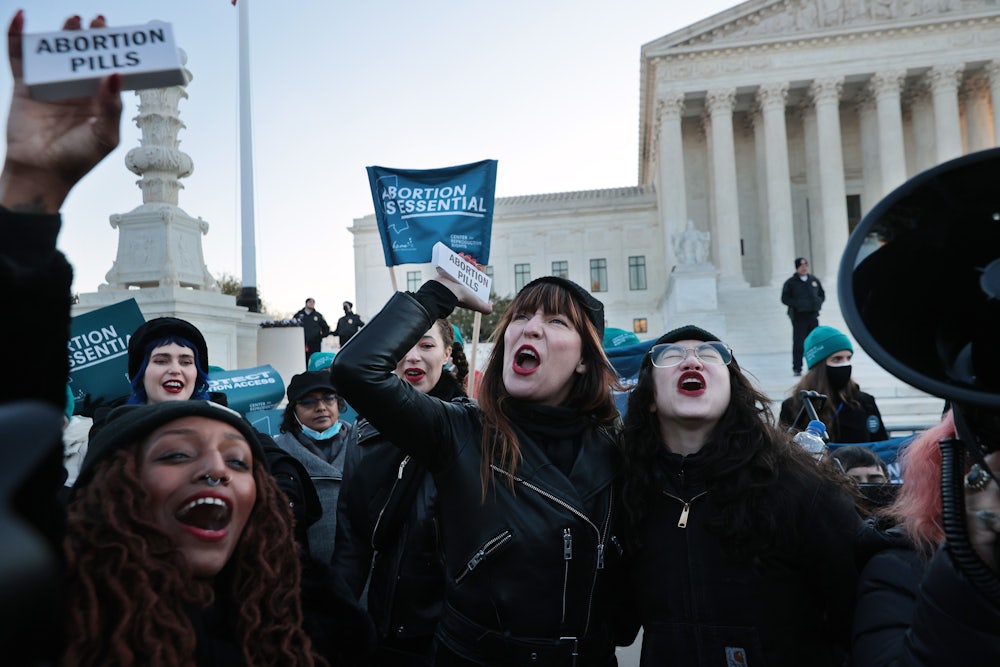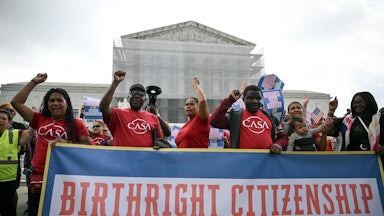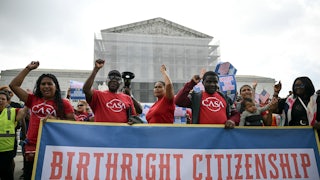It is quite possible, even likely, that abortion rights as we’ve known them in America for half a century will no longer exist two months from now.
The Supreme Court is expected to issue a ruling this June in Dobbs v. Jackson Women’s Health Organization, concerning a Mississippi law that would ban abortions after 15 weeks. The state has asked the court to uphold that law and overturn Roe v. Wade, the 1973 ruling establishing a woman’s constitutional right to abortion, and Planned Parenthood v. Casey, the 1992 ruling that reaffirmed the right and set the standard that a state may not place an “undue burden” on a women seeking an abortion.
Both sides of the abortion debate expect the court, with its solid 6–3 conservative majority, to overturn Roe; the justices indicated as much in oral arguments last December. Several Republican-led states have recently passed laws severely restricting abortion access in anticipation of this ruling, while fewer blue states have sought to expand protections. Supporters of abortion rights will have little legal recourse to challenge the state restrictions, absent Congress passing legislation to legalize abortion on the federal level. This is exceedingly unlikely for the foreseeable future.
But the larger universe of voters could be shocked by the sudden end to women’s constitutional right to an abortion—and, Democrats hope, be motivated to turn out in larger numbers in the November midterm elections, in which Democrats are predicted to fare poorly. This will be particularly critical for the party’s Senate candidates; by maintaining control of the Senate, Democrats would have the power to confirm future Supreme Court nominees who are more likely to protect abortion rights, whatever might befall Roe in June.
The electoral consequences of the end of Roe is one of the biggest unknowns in American politics in 2022.
Polling consistently finds that the majority of Americans are opposed to overturning Roe. A Gallup poll released in June of last year found that 58 percent of Americans opposed overturning Roe, and a CNN poll published this January found 69 percent of Americans in opposition. However, views on the procedure itself can be more nuanced. Gallup polling shows that while 32 percent of Americans believe abortion should be legal under any circumstances, 48 percent believe it should be legal only under certain circumstances. An AP-NORC poll from June of last year found that 65 percent of Americans believe abortion should be illegal in the second trimester of pregnancy, and 80 percent said that about the third trimester.
But even within those parameters, it’s complicated. A November Washington Post-ABC News poll found that 75 percent of Americans believe such decisions should be left to a woman and her doctor. And a February poll by PerryUndem, a public opinion research firm, found that while 57 percent of voters believe abortions should be illegal in the second three months of pregnancy, 34 percent of those respondents say they would prefer state lawmakers to stay out of the issue.
“Abortion is a proxy for other things as well that relate to power, control, and freedom,” said Tresa Undem, a partner and co-founder of PerryUndem. “If you know how a politician feels about abortion, if they’re anti-abortion, that tells you a lot about a number of other issues that you care about.”
But polling also shows that, regardless of how Americans feel about the legality of abortion, it may not be a hugely motivating factor in their vote. The January CNN poll found that while 60 percent of Americans said they would be angry or dissatisfied if Roe were overturned, only 20 percent say that they would only vote for candidates who share their views on abortion. Fifty-nine percent said they would consider it as one of many important factors, and 21 percent said they do not see it as a major issue. In a YouGov/Economist poll released last October, only 4 percent of Americans ranked abortion as their top issue.
The kind of elections occurring in November—that is, everything but presidential—may also be a factor. “Probably the politician that people associate most with abortion restrictions is the president, even though senators vote to confirm judges. So it’s a little harder to predict how that will affect races,” said Mary Ziegler, a professor at Florida State University and the author of several books on abortion rights in the U.S. “If Republicans take control of the Senate and, say, Clarence Thomas were to retire or die or something, there probably wouldn’t be any new nominee confirmed if Joe Biden was in the White House.… And you could theoretically imagine a Republican Congress passing a statute banning abortion, or something like that. So the stakes are real. It’s just, if people are thinking about the Supreme Court, they may not think as much of Congress as they would of the president.”
But it’s possible that, if and when Roe is overturned, voters might take the issue more seriously. At the moment, voters may not realize the extent to which abortion rights are at risk, nor how they would personally be affected in their state. A November YouGov/Economist poll found that only 13 percent of Americans believed it was very likely that Roe would be overturned, while 46 percent said there was a 50-50 chance. According to a 2020 poll by the Kaiser Family Foundation, only 38 percent of those living in states with “trigger” laws knew that abortion would immediately become illegal in their state if Roe was overturned. The February PerryUndem poll found that while 70 percent of voters have the impression that the right to an abortion is at risk, only 19 percent of voters had heard “a lot” about the abortion case before the Supreme Court.
“[Voters] kind of have a feeling, in a sense, that things are at risk, that the right to an abortion is at risk, that access might be at risk. But they really don’t know about the Supreme Court case, they don’t know about all the bans and restrictions in place, they don’t know about the decreased access already,” said Undem. “The overturning of Roe would obviously break through to voters.… And we think even though they have that sense that rights are at risk, it would be pretty shocking to them. It wouldn’t be surprising in a way, but it would still be shocking.”
At least one recent political campaign tried to capitalize on voter sentiment around abortion. After Texas enacted a restrictive law last year that earned national coverage, Virginia Democratic gubernatorial candidate Terry McAuliffe repeatedly emphasized that he would protect abortion rights as governor, and Democrats wondered if the issue could juice turnout. McAuliffe lost soundly to Republican Glenn Youngkin. While the Texas law is nationally unpopular, though, the power of one law in a faraway state to motivate people to vote may be far less than the Supreme Court overturning 49 years of precedent.
The PerryUndem poll found that 37 percent of respondents said that the Supreme Court overturning Roe would make them more likely to vote in the midterms. Democrats would be more motivated than Republicans; 51 percent of Democratic women and 47 percent of Democrats said it would make them more likely to vote. Twenty-seven percent said they would be more likely to vote for candidates who support abortion rights and access.
It’s an open question whether that will be enough to help Democrats maintain their majorities in the House and Senate. And even if voters do get more fired up than they would be otherwise, Democrats could still be hampered by structural disadvantages. “The states that are going to be banning abortion, for the most part, with exceptions of places like Michigan or Wisconsin, are not likely to be politically competitive in 2022,” Ziegler said.
The situation is complicated even in some states with competitive statewide races. In Georgia, Republican Governor Brian Kemp is locked in a tight reelection campaign. But even if he were to lose, Georgia has already passed a law banning abortion after six weeks of pregnancy which could go into effect if Roe is overturned.
This limited power can be seen in the current struggles of Democratic governors in states with divided party control. Michigan Governor Gretchen Whitmer, a Democrat, filed a lawsuit this month asking the state Supreme Court to declare abortion legal in her state, which has a 1931 law on the books banning abortion that has been superseded by Roe. Kentucky currently has a Democratic governor, but the Republican-led state legislature this week overrode his veto to pass some of the most stringent abortion restrictions in the country. The Democratic prosecutors who could choose to uphold the Supreme Court’s decision or not, could be more critical in these states than the governors.
There’s also the question of whether overturning Roe could motivate voters who oppose abortion rights. “I don’t think it’ll really change much for them. Anti-abortion activists have been motivated by the idea of criminalizing all abortions. Getting rid of Roe is like, that’s nice, and they agree on that,” Ziegler said, noting that overturning Roe may not have a dramatic effect on abortion rates because so many Republican-led states have such limited access to abortion already. “If you’re in the anti-abortion movement, you’re going to think that this is just sort of a step on the way to a much broader, potentially ideally from your standpoint, national ban.”
But Republican voters who are not passionate about restricting access to abortion could be surprised by the court issuing such a ruling. Federal Texas lawmakers like Senators Ted Cruz and John Cornyn did not go out of their way to tout the restrictive law when it was approved last year. An October NPR/PBS NewsHour/Marist poll that found that most Americans opposed the Texas law also showed that the majority of Republicans were against it. According to a Pew Research poll published last May, 35 percent of Republicans believe abortion should be legal in all or most cases—a minority, but not an insignificant one. The PerryUndem poll found that, if Roe were overturned, only 8 percent of voters said it would make them more likely to vote for candidates against rights and access to abortion.
It’s possible that the court tacks a middle ground and upholds the Mississippi law without fully overturning Roe or Casey. In that case, Undem said, the topic of abortion rights may be less important in the midterms than otherwise.
“If Roe is not overturned explicitly, then we have a whole different scenario, because I don’t think the media would cover that as much, and I don’t think it would break through,” Undem said. “I think voters would still be in the dark, and therefore it wouldn’t have as big of an impact on midterms or even longer-term impact.”






